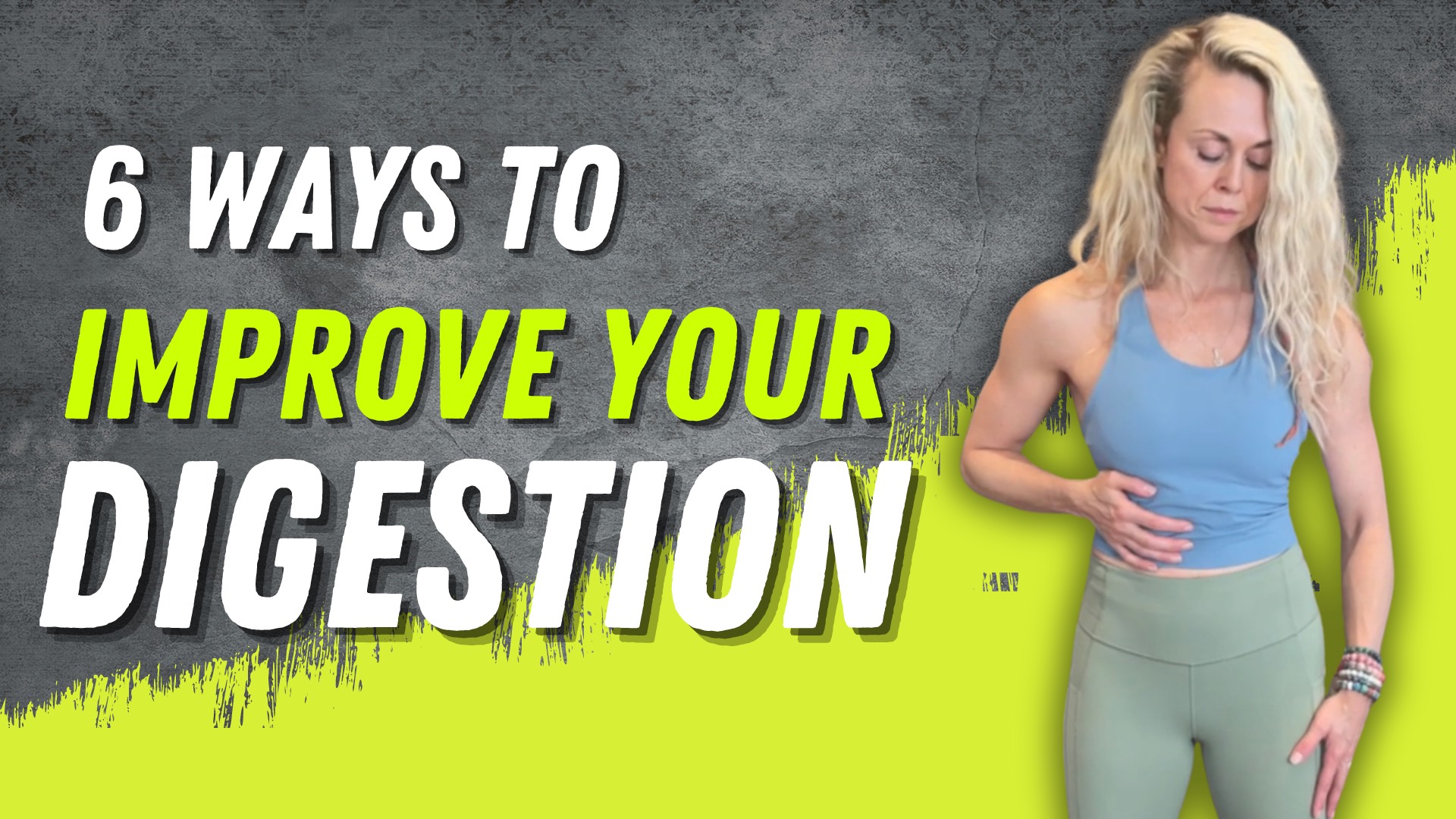Are you experiencing digestive issues such as bloating, constipation, diarrhea, belching, or gas? In this blog, we’re going to dive into six specific ways on how to improve your digestion.
We’ll also explain the importance of a healthy digestive system and how to achieve it through natural practices.
Rather watch or listen?
What You Need to Know About Digestion
Digestion is a complex process with many variables, but there’s a lot we can control. The breakdown of food starts in the mouth with enzymes from saliva. The stomach uses hydrochloric acid and pepsin to break down proteins. The pancreas releases enzymes to break down carbs, proteins, and fats. The liver and gallbladder produce bile to aid fat digestion. The small intestine has enzymes to complete digestion.
When digestion breaks down, it can lead to gut issues like dysbiosis, leaky gut, inflammation, and even pathogens.
So, what are some tips to improve digestion?
6 Tips to Improve Digestion
1. Bringing yourself to a parasympathetic nervous system state
This means ‘rest and digest.’ When in fight-or-flight mode, blood flow moves away from the digestive tract. If we’re multitasking, like reading or looking at our phone, we’re increasing cortisol and diverting blood flow away from the digestive tract, which slows digestion. I recommend a nervous system practice before eating.
If you’re stressed or anxious, you might need to do a somatic practice to get rid of excess energy. This could be shaking, bouncing, or body drumming. Follow this with diaphragmatic breathing: in through the nose, out through the nose, tongue at the roof of the mouth, allowing the abdomen to expand and contract fully. This helps bring blood flow back to the digestive tract. You can also take a moment of gratitude or mindfulness to be present with your food.
2. Limiting your water intake around meals or fluid intake
If you’re having digestive issues, try to limit water intake to 15 minutes before, during, and 15 minutes after meals. Increased fluid around meals can decrease stomach acid and reduce digestion efficiency. From an Eastern medicine perspective, drinking cold water can also negatively affect digestion. Plan your fluid intake to avoid excessive drinking during meals.
3. Chewing your food 20 to 30 times
Chewing is crucial for optimizing digestion because it breaks food into small particles before it reaches the small intestine. Even if the food is soft, try to chew as much as possible. Ensure your diet includes food that requires chewing and isn’t all soft processed foods. Modern society’s shift toward softer foods has affected jaw structure and chewing ability.
4. Walking after your meals
A short walk, even as brief as 2-5 minutes, can significantly aid digestion. This is preferable to eating a large meal and then lying down on the couch. Walking helps support the digestive process, so it’s a great habit to form.
5. Meal spacing
This is important for people with digestive issues. Meal spacing is vital for the migrating motor complex (MMC) in the small intestine, a wave-like action that moves food through the digestive tract and aids in bacterial transport from the small intestine into the large intestine. Eating too frequently, like every two and a half hours, can disrupt the MMC and slow digestion.
To optimize our motility in our gut, we want to space the meals out. Aim for at least three to four hours in between meals and an overnight fast for 12 hours.
Everyone’s day will look different based on activity, interests, and preferences, but try to focus on spacing the meals out instead of frequent grazing and snacking.
6. Nervous system regulation
Regulating the nervous system is crucial for digestion, not just around mealtime but throughout the day. If you’re constantly in fight-or-flight or freeze mode, it affects digestion. Try nervous system-regulating practices like breathing exercises, shaking, body drumming, or swaying. Before bed, you can do abdominal massage techniques to calm your nervous system and enter a state of social engagement, connection, and safety, which can optimize digestion.
If this was helpful, please give it a like, share it, and subscribe to our YouTube channel, the Movement Paradigm, for weekly tips on mindset, nutrition, and movement. Our goal is to help you live your best life, heal, transform, and, more importantly, thrive.
You can always join us in our app, the Movement Paradigm. We have lots of challenges every other month—everything from movement to the nervous system, nutrition, and so on. And we have a great community of people.
You can also reach out to us for an individual appointment for functional medicine or holistic physical therapy. If you really want to get to the root cause, please reach out to us.
Other things that might interest you:

